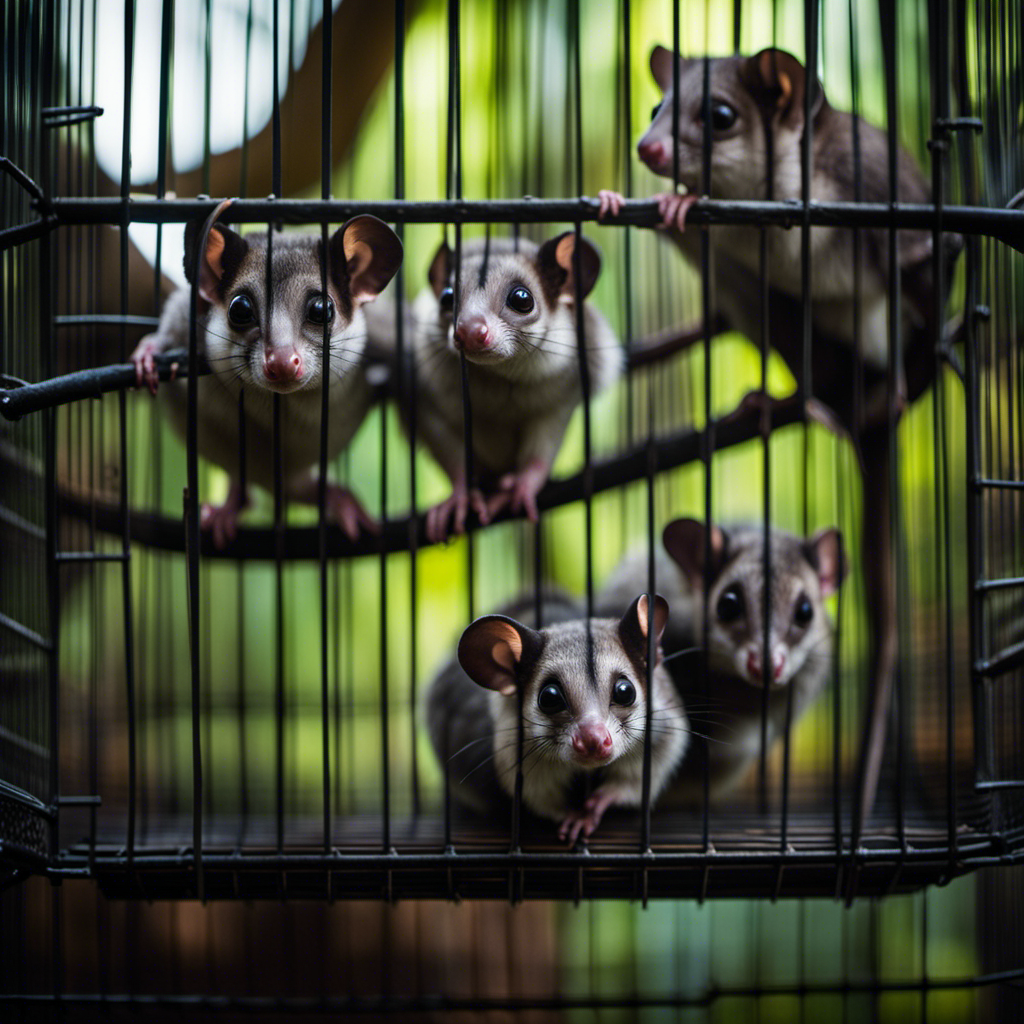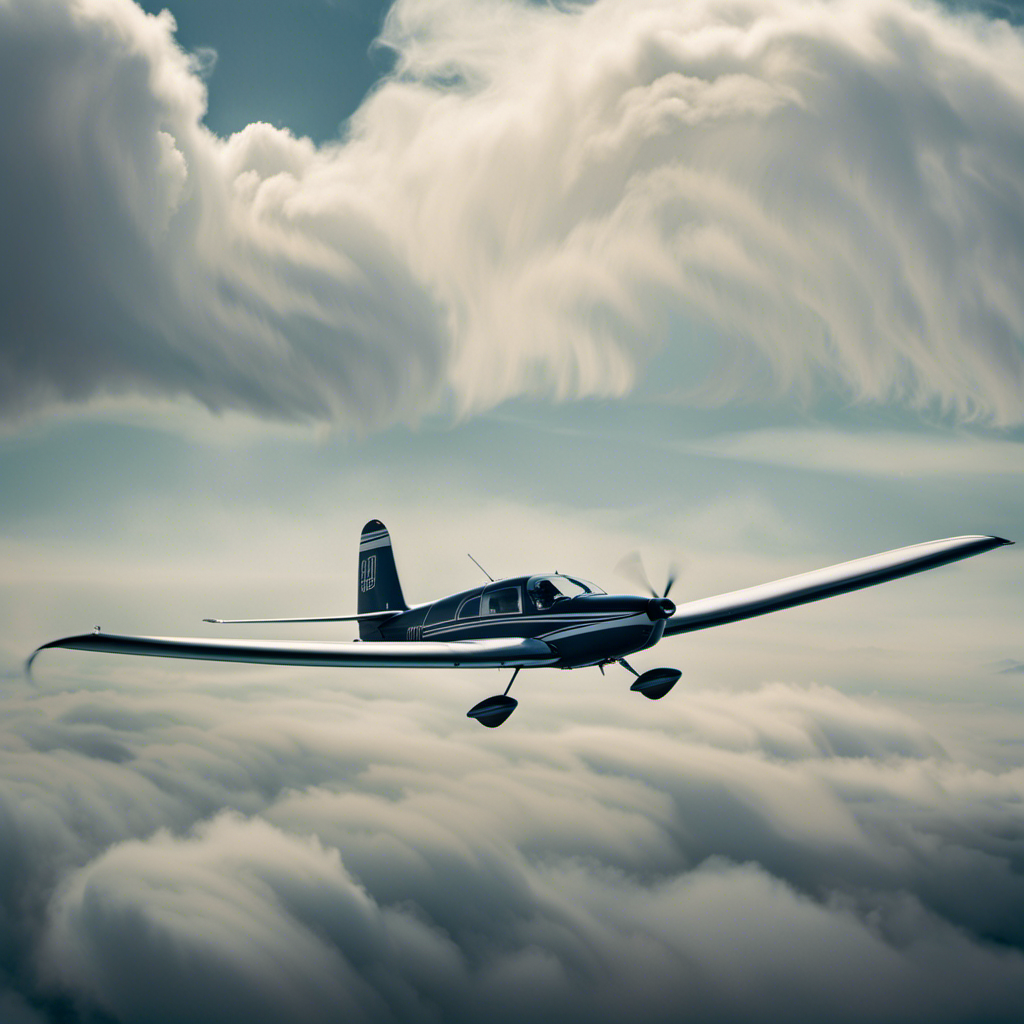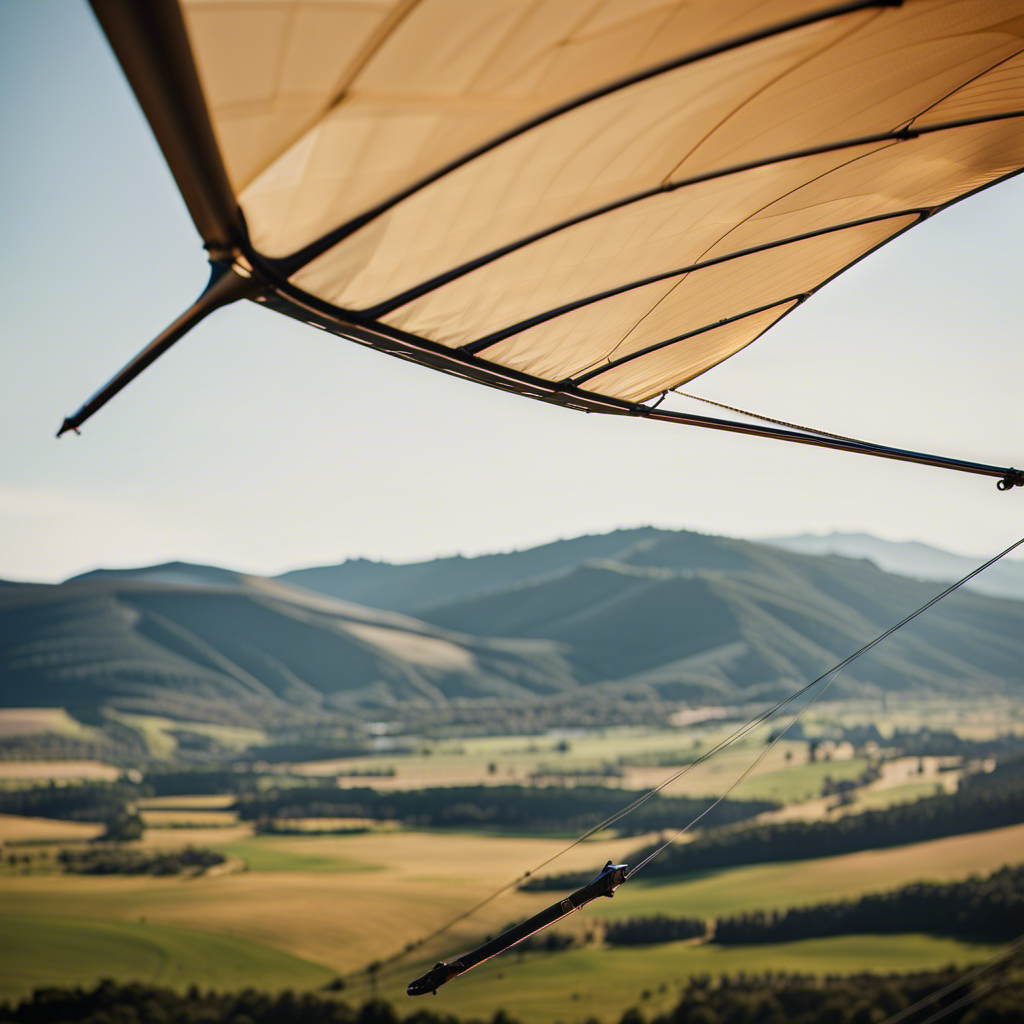Honestly, I am torn on the notion of keeping sugar gliders as pets. These tiny creatures are undeniably adorable and can make great companions. However, I struggle with the ethical dilemma of confining them to a life in captivity.
In this article, we’ll explore both sides of the argument, examine the legal considerations, and discuss proper care and husbandry for sugar gliders. By the end, I hope to help you make an informed decision about whether keeping sugar gliders as pets is truly compassionate or not.
Key Takeaways
- Sugar gliders require specialized care and husbandry to ensure their well-being in captivity.
- There are arguments both for and against keeping sugar gliders as pets, with considerations for their social nature and the ethical concerns of captivity.
- Meeting the needs of sugar gliders can be challenging, including providing a large cage, a diet rich in fruits, vegetables, and proteins, and daily interaction and mental stimulation.
- Keeping sugar gliders as pets can have an impact on wild populations, including habitat disruption, potential disease transmission, and a decrease in genetic diversity.
Overview of Sugar Gliders as Pets
Sugar gliders make popular pets due to their small size and adorable appearance. However, it is important to understand that these creatures require specialized care to thrive in a domestic environment.
They are highly social animals, known for their complex social behavior and strong bond with their owners. To ensure their well-being, sugar gliders need a large cage with plenty of space for climbing and gliding, as well as a diet rich in fruits, vegetables, and high-quality proteins. Additionally, they require daily interaction and mental stimulation to prevent boredom and loneliness.
By providing the necessary care and attention, sugar gliders can lead happy and fulfilling lives as pets.
Transitioning into the subsequent section, let’s now explore the arguments in favor of keeping sugar gliders as pets.
Arguments in Favor of Keeping Sugar Gliders as Pets
One reason people enjoy having sugar gliders as companions is because they are social creatures. They have a natural inclination to interact with their owners and form strong bonds.
Here are some pros and cons of keeping sugar gliders as pets:
- Unconditional Love: Sugar gliders are known for their affectionate nature, providing endless love and companionship.
- Entertainment: These playful creatures love to climb, glide, and explore their surroundings, providing hours of entertainment for their owners.
- Low Maintenance: Sugar gliders are relatively low maintenance pets, requiring minimal grooming and exercise.
- Educational: Owning sugar gliders can be a great learning experience for children, teaching them about responsibility and the importance of caring for animals.
While there are many benefits to keeping sugar gliders as pets, it’s important to consider the drawbacks as well. In the next section, we will explore the arguments against keeping sugar gliders as pets.
Arguments Against Keeping Sugar Gliders as Pets
As someone who deeply cares about the welfare of animals, it’s important to consider the ethical concerns surrounding the captivity of sugar gliders.
These small creatures have specialized needs that can be challenging to meet in a domestic setting, which raises questions about their overall well-being and quality of life.
Additionally, the impact of capturing and keeping sugar gliders as pets can have serious consequences on wild populations. This can potentially disrupt their natural habitats and endanger their survival.
Ethical concerns about captivity
Did you consider the ethical concerns surrounding keeping sugar gliders in captivity? As someone who cares deeply about animal welfare, it’s important to acknowledge the potential ethical dilemmas that arise when these adorable creatures become pets.
Sugar gliders are highly social animals that thrive in their natural habitat, where they can glide through the treetops and live in close-knit family groups. In captivity, however, they may experience loneliness, stress, and a lack of mental stimulation. These conditions can have a negative impact on their overall well-being.
Ensuring that sugar gliders are kept in environments that mimic their natural habitat and providing them with proper socialization and enrichment is crucial. By understanding and addressing the ethical concerns, we can work towards meeting their specialized needs and ensuring their welfare as pets.
Challenges in meeting their specialized needs
To properly care for them, it’s crucial that you understand and address the challenges in meeting the specialized needs of these adorable creatures.
Sugar gliders have specific dietary requirements that must be met to ensure their health and well-being. Their diet should consist of a balanced mix of fruits, vegetables, proteins, and supplements.
Additionally, providing appropriate socialization is essential for these social animals. They thrive in the company of other sugar gliders and need ample opportunities for play and exercise.
As responsible pet owners, it is our duty to create an environment that mimics their natural habitat as closely as possible. By meeting their dietary needs and providing appropriate socialization, we can ensure that sugar gliders lead happy and fulfilling lives in captivity.
However, it is important to consider the impact of keeping sugar gliders as pets on wild populations.
Impact on wild populations
Understanding the impact on wild populations is crucial when considering the care and conservation of these fascinating creatures. Sugar gliders, while captivating as pets, have a significant ecological impact that should not be overlooked. Here are four important points to consider:
-
Habitat destruction: The capture and trade of sugar gliders for the pet industry often leads to habitat destruction, as their natural environments are disrupted to meet demand.
-
Disruption of food chains: Removing sugar gliders from their natural habitats can have ripple effects on local ecosystems, potentially disrupting the balance of prey and predator populations.
-
Disease transmission: Domesticated sugar gliders can carry diseases that may be harmful to wild populations if they were to escape or be released into the environment.
-
Genetic diversity: Overbreeding and hybridization in captivity can lead to a decrease in genetic diversity, potentially impacting the long-term survival of wild sugar glider populations.
Considering these factors, it becomes clear that responsible wildlife conservation should prioritize the preservation of sugar gliders in their natural habitats.
Transitioning to the next section, let’s explore the legal considerations and regulation of sugar glider ownership.
Legal Considerations and Regulation of Sugar Glider Ownership
You should be aware that owning a sugar glider as a pet may be regulated or even prohibited in certain areas. It is important to understand the legal implications and ethical concerns surrounding sugar glider ownership before considering it as a pet.
While they are legal to own in many places, some jurisdictions have restrictions due to concerns about their impact on local ecosystems or potential welfare issues. For example, in some areas, sugar gliders are considered wildlife and may require special permits or licenses to keep as pets.
Additionally, there are ethical concerns related to the capture and trade of wild sugar gliders for the pet trade. It is crucial to research and understand the regulations and ethical considerations in your area before deciding to bring a sugar glider into your home.
Ensuring proper care and husbandry for sugar gliders is essential to their well-being.
Proper Care and Husbandry for Sugar Gliders
When it comes to properly caring for sugar gliders, there are several key points that need to be addressed.
First and foremost, their diet and nutrition play a crucial role in their overall health and well-being. Providing them with a balanced and varied diet is essential to meet their nutritional needs.
Secondly, their housing and environmental enrichment are important factors to consider. Sugar gliders are highly active animals and require a spacious and stimulating environment to thrive.
Lastly, veterinary care and socialization are crucial for their overall health and happiness. Regular vet check-ups and proper socialization with humans and other gliders are essential for their physical and mental well-being.
Diet and nutrition
To ensure your sugar glider remains healthy, it’s important to provide them with a balanced diet and proper nutrition. Sugar gliders have unique feeding habits and specific nutritional requirements that must be met to promote their well-being. They are omnivorous creatures, meaning they eat both plant-based foods and insects. Their diet should consist of a variety of fresh fruits, vegetables, and protein sources such as insects, eggs, and lean meats. To give you a better idea, here is a table outlining the recommended daily feeding plan for a sugar glider:
| Food Group | Quantity | Frequency |
|---|---|---|
| Fruits | 1-2 tablespoons | Daily |
| Vegetables | 1-2 tablespoons | Daily |
| Protein | 1-2 tablespoons | Every other day |
| Insects | 2-3 insects | Every other day |
Housing and environmental enrichment
Providing a suitable habitat and enriching environment is crucial for the well-being of sugar gliders. When it comes to housing options, both indoor and outdoor setups have their pros and cons.
Indoor housing offers better protection from predators and extreme weather conditions, while outdoor housing allows for more natural sunlight and fresh air. However, regardless of the housing choice, it’s important to prioritize social interaction for sugar gliders.
These social creatures thrive on companionship and need the opportunity to interact with their own kind. It’s recommended to house sugar gliders in pairs or small groups to ensure their social needs are met.
By creating a stimulating environment with plenty of toys, climbing structures, and hiding spots, we can provide a happy and enriched life for these adorable marsupials.
Transitioning into the next section, proper veterinary care and socialization are also essential for their overall well-being.
Veterinary care and socialization
Make sure you take your sugar glider to a veterinarian experienced in exotic animal care for regular check-ups and any necessary medical treatments. Proper veterinary care is crucial to ensure the health and well-being of your sugar glider.
Here are three important aspects of veterinary care and socialization for sugar gliders:
-
Regular check-ups: It’s important to schedule regular check-ups with a knowledgeable veterinarian who understands the unique needs of sugar gliders. These check-ups help detect any potential health issues early on and ensure that your glider is receiving the necessary vaccinations and preventive care.
-
Medical treatments: If your sugar glider requires any medical treatments, such as deworming or dental care, it’s essential to follow your veterinarian’s recommendations. They can provide the appropriate medications and guidance to ensure your glider’s optimal health.
-
Socialization: Sugar gliders are social animals and require regular interaction and stimulation. Your veterinarian can provide guidance on proper socialization techniques to ensure your glider remains happy and mentally stimulated.
Potential Risks and Challenges of Keeping Sugar Gliders as Pets
When considering the potential risks and challenges of keeping sugar gliders as pets, there are several key points to explore.
Firstly, allergies and zoonotic diseases can be a concern for both the owner and the sugar glider. It’s important to be aware of any allergies you or your family members may have, as well as the possibility of transmission of diseases from the sugar glider to humans.
Additionally, behavior and bonding issues can arise when owning a sugar glider, as these animals require a significant amount of time, attention, and socialization to thrive.
Lastly, one must also consider the longevity and commitment required when taking on the responsibility of a sugar glider, as they can live up to 15 years in captivity and require specialized care throughout their lifespan.
Allergies and zoonotic diseases
If you have allergies or are concerned about zoonotic diseases, it’s important to consider the potential risks of keeping sugar gliders as pets. While these adorable creatures can make great companions, it’s crucial to prioritize disease prevention and be aware of the possibility of allergic reactions.
Sugar gliders can carry bacteria, parasites, and viruses that can be transmitted to humans. To minimize the risk, regular veterinary check-ups, proper hygiene, and appropriate handling techniques are essential.
Additionally, some individuals may have allergies to the gliders’ fur, dander, or urine. It’s crucial to consult with an allergist before bringing a sugar glider home.
By being proactive and taking necessary precautions, you can ensure a safer environment for both you and your pet.
Moving on to behavior and bonding issues, it’s important to address another aspect of keeping sugar gliders as pets.
Behavior and bonding issues
Understanding the behavior and bonding issues of sugar gliders is crucial for creating a strong and fulfilling relationship with these unique companions. As someone who has cared for sugar gliders for many years, I have learned that they require special attention and understanding. Here are some key points to consider:
-
Bonding difficulties: Sugar gliders are social creatures and need regular interaction to form strong bonds with their human caregivers.
-
Behavioral issues: Some sugar gliders may exhibit aggressive or fearful behaviors if they are not properly socialized or if their needs are not met.
-
Patience and consistency: Building trust with a sugar glider takes time and patience. Consistent handling, positive reinforcement, and a structured routine can help overcome bonding difficulties.
-
Enrichment activities: Providing a stimulating environment with plenty of toys, climbing opportunities, and safe exploration spaces can help alleviate behavioral issues and keep sugar gliders mentally and physically stimulated.
-
Seeking professional help: If you are experiencing significant bonding difficulties or behavioral issues with your sugar glider, it is important to seek guidance from a veterinarian or an experienced sugar glider owner.
Understanding and addressing bonding difficulties and behavioral issues is essential for a harmonious relationship with sugar gliders. It sets the stage for the next section on the longevity and commitment required to properly care for these fascinating creatures.
Longevity and commitment
To ensure a long and fulfilling relationship with these remarkable creatures, it’s important to fully commit to the care and well-being of sugar gliders. These adorable marsupials have a lifespan of 10 to 15 years in captivity, and they require dedicated attention throughout their lives.
Sugar gliders need a balanced diet that includes fresh fruits, vegetables, and protein-rich foods. Their housing should provide ample space for exercise, socialization, and mental stimulation. Regular veterinary check-ups are essential to catch any health issues early on.
Additionally, social interaction is crucial for their emotional well-being, as they are highly social animals that thrive in the company of their own kind. By making a long-term commitment to their care, you can ensure that your sugar glider lives a happy and healthy life.
Transitioning into the subsequent section about responsible ownership and education for sugar glider owners, it’s important to understand the importance of being well-informed about their needs and behaviors.
Responsible Ownership and Education for Sugar Glider Owners
Responsible sugar glider owners should prioritize education about their pets’ needs and behaviors. It is crucial to understand that sugar gliders have specific requirements to thrive in captivity. Here are three key points that responsible owners should consider:
-
Proper diet: Sugar gliders are omnivores and need a balanced diet consisting of fresh fruits, vegetables, protein, and specially formulated pellets. It is important to provide them with a variety of foods to ensure they receive the necessary nutrients.
-
Socialization and enrichment: These small creatures are highly social and require daily interaction and mental stimulation. Owners should provide them with plenty of toys, climbing structures, and opportunities to glide to keep them physically and mentally active.
-
Veterinary care: Regular check-ups with an exotic animal veterinarian familiar with sugar gliders are essential. They can provide guidance on diet, health issues, and preventive care.
By prioritizing education and implementing these practices, responsible owners can provide a happy and healthy environment for their sugar gliders.
Transitioning into the next section, let’s explore alternative options for sugar glider enthusiasts.
Alternative Options for Sugar Glider Enthusiasts
Transitioning into the next section, let’s explore some other choices for people who are enthusiastic about sugar gliders. For those seeking alternative housing options, there are various setups available that can cater to the gliders’ needs.
One option is a custom-built enclosure that mimics their natural habitat, complete with branches, climbing structures, and nesting areas. This allows for more space and freedom of movement, promoting their physical and mental well-being. Additionally, some owners opt for large aviaries or specially designed cages with multiple levels to provide ample space for exploration.
When it comes to socialization, there are several options to consider. Sugar gliders are highly social animals and benefit from interaction with their human caregivers and other gliders. Bonding pouches can be used to carry them close to you, allowing for bonding time and providing a sense of security. Playtime outside the enclosure, under close supervision, can also be beneficial for their social and mental stimulation.
Expert Opinions and Research on Sugar Glider Welfare
As we explore alternative options for sugar glider enthusiasts, it is important to consider expert opinions and research on sugar glider welfare. The well-being of these unique creatures is a top priority for conservation organizations and researchers.
Here are four key insights into sugar glider welfare and the impact on the pet trade:
-
Conservation Efforts: Sugar glider conservation efforts focus on protecting their natural habitats and raising awareness about their status as vulnerable species.
-
Proper Care: Experts emphasize the importance of providing a suitable environment, proper nutrition, and social interaction for captive sugar gliders.
-
Behavioral Needs: Studies have shown that sugar gliders have complex social behaviors and require mental stimulation through activities such as climbing, gliding, and foraging.
-
Ethical Considerations: Keeping sugar gliders as pets raises ethical concerns due to their specific needs and the potential impact on their wild populations.
With these insights in mind, let’s now transition to the conclusion: making an informed decision about sugar glider ownership.
Conclusion: Making an Informed Decision about Sugar Glider Ownership
Consider all the information you’ve gathered about sugar gliders and their welfare to make an informed decision about whether owning one is right for you.
When considering ethical considerations, it is important to understand the potential impact of keeping sugar gliders as pets. While these adorable creatures can form strong bonds with their human owners, they have specific needs that must be met to ensure their well-being. It is crucial to provide a suitable environment, proper nutrition, and social interaction for their mental and physical health.
Additionally, it is essential to be aware of the legal regulations surrounding sugar glider ownership in your area. Some regions may have restrictions or require permits, so it is important to comply with these laws to avoid any legal issues.
Frequently Asked Questions
Are sugar gliders legal to own as pets in all states?
Yes, sugar gliders are legal to own as pets in most states, but there may be legal restrictions and ethical considerations. It’s important to research and understand the laws and requirements in your specific area before getting one as a pet.
What are the potential health risks for sugar gliders living in captivity?
Potential health risks for sugar gliders living in captivity include obesity, dental problems, and metabolic bone disease. Meeting their nutritional requirements, such as a balanced diet and proper calcium intake, is crucial to prevent these issues.
How much time and attention do sugar gliders require on a daily basis?
Sugar gliders require a significant time commitment and daily attention. They thrive on bonding with their owners, needing social interaction, playtime, and mental stimulation. This helps create a strong and positive relationship between the glider and its owner.
Can sugar gliders be trained or socialized to live comfortably with humans?
Yes, sugar gliders can be trained and socialized to live comfortably with humans. Training techniques like positive reinforcement and bonding activities such as cuddling can help create a strong bond and ensure their well-being.
Are there any alternative options for individuals who are interested in sugar gliders but have concerns about their welfare as pets?
If you’re concerned about the welfare of sugar gliders as pets, there are many suitable alternatives. Consider adopting a small mammal like a hamster, guinea pig, or rat. It’s important to consider the ethical implications of keeping exotic animals as pets.
Conclusion
After delving into the world of sugar gliders as pets, it’s clear that there is no simple answer to the question of whether it’s cruel to keep them. Like a delicate balancing act, their welfare depends on various factors such as proper care, education, and responsible ownership.
Just as a symphony requires a skilled conductor to harmonize its melodies, sugar glider ownership demands an informed and compassionate approach. By taking the time to understand their needs and providing a nurturing environment, we can create a sweet and fulfilling companionship with these enchanting creatures.









